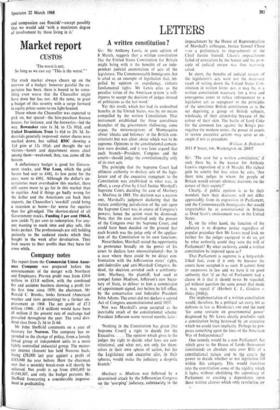A written constitution?
LETTERS
Sir: Mr Anthony Lewis, in your edition of 8 March, suggests that a written constitution like the United States Constitution for Britain might bring with it the benefits of an inde- pendent judicial examination of acts of the legislature. The Commonwealth Immigrants Act is cited as an example of legislation that, im- pelled by opinion or expediency, violates fundamental rights. Mr Lewis cites as the peculiar virtue of the American system 'a will- ingness to accept the decision of judges instead of politicians as the last word.'
Yet this result, which has had its undoubted benefits in the United States, was by no means compelled by the written Constitution. That instrument established the three coordinate branches of the government (following, some argue, the misconceptions of Montesquieu about 'checks and balances' in the British con- stitution) but was silent about which was to be supreme. Opinions in the constitutional conven- tion were divided, and it was later argued that each branch—President, Congress and the courts—should judge the constitutionality only of its own acts.
The principle that the Supreme Court had ultimate authOrity to declare acts of the legis- lature and of the executive repugnant to the Constitution was established in what was, in effect, a coup d'etai by Chief Justice Marshall's Supreme Court, deciding the case of Marbury v. Madison in 1803. 'The decision was a narrow one, Marshall's judgment declaring that the statute conferring jurisdiction of the suit upon the Supreme Court was in excess of Congress's powers; hence the action must be dismissed. Note that the case involved only the powers of the Congress over the Supreme Court, and could have been decided on the ground that each branch was the judge only of the applica- lion of the Constitution to its own functions.
Nevertheless, Marshall seized the opportunity to pronounce broadly on the power of his court to declare laws unconstitutional—but in a case where there could be no direct con- frontation with the Jeffersonian states' rights, anti-federalist -and anti-Marshall Congress. In- deed, the decision avoided such a confronta- tion; Marbury, the plaintiff, had sued to compel James Madison, Jefferson's new Secre- tary of State, to deliver to him a commission of appointment signed, just before he left office, by the conservative and federalist President John Adams. The court did not declare a second Act of Congress unconstitutional until 1857.
Nor was Marshall's coup accepted as the inevitable result of the constitutional scheme. President Jefferson wrote several months later:
'Nothing in the Constitution has given [the Supreme Court] a right to decide for the Executive. . . . The opinion which gives to the judges the right to decide what laws are con- stitutional, and what not, not only for them- selves in their own sphere of action, but for the Legislature and executive also, in their Spheres, would make the judiciary a despotic branch,' Marbury N. Madison was followed by a determined attack by the Jeffersonian Congress
on the 'usurping' judiciary, culminating in the _ _ _ _ impeachment by the House of Representatives of Marshall's colleague, Justice Samuel Chase —as a preliminary to impeachment of the Chief Justice himself. Chase's impeachment failed of conviction by the Senate and the pros- ciple of judicial review was thus narrow ly saved.
In short, the benefits of judicial review of the legislature's acts were not the necessary result of setting down the United States Con- stitution in written form; nor, it may be, is a written constitution necessary for a wise and courageous court to refuse enforcement to a legislative act as repugnant to the principles of the unwritten British constitution as is the act deprivin& a group of British subjects, wholesale, of their citizenship because of the colour of their skin. The battle of Lord Coke for the common law against the King's pre- rogative (in modern terms, the power of courts to review executive action) may serve as ex- ample if not as precedent.
William A. Dobrovir 3011 P Street, NW, Washington, DC 20007






































 Previous page
Previous page